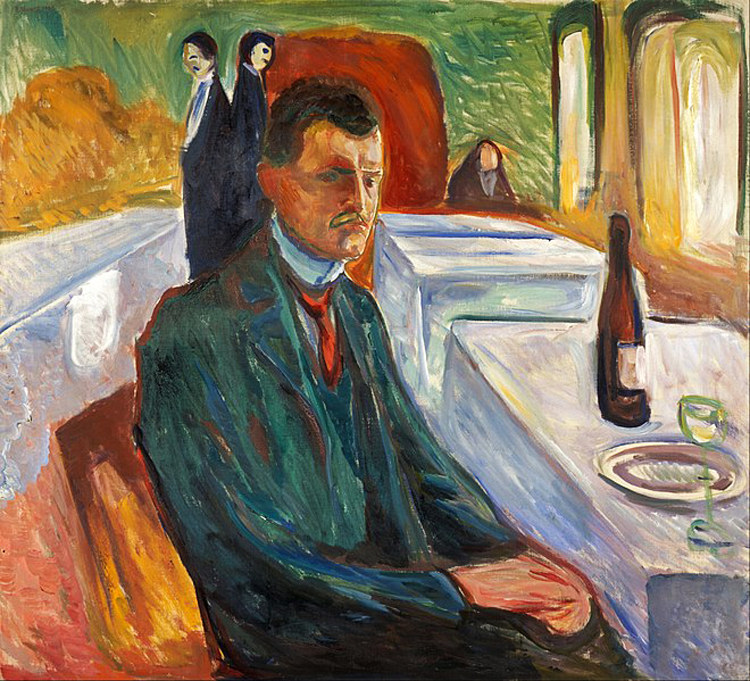by David Solway (June 2022)

Self Portrait with a Bottle of Wine, Edvard Munch, 1906
1.
Dark garnet in the glass.
Bouquet of berries and spice, also tobacco
as if a pack of cigarettes were in the bottle.
Core flavours of cherry and currant
laced with pepper, olive and smoke.
Tannins bring hints of menthol to the finish.
It has the complexity of the fugue.
It is like a winning calculation in poker
or the neural subtlety of a master hacker.
It is experimental and adventurous.
It is like good sex.
2.
This wine has grown here for centuries,
vines springing from clean slate and limestone,
grapes ripening in the long, cool, vegetal season
full of sun and smoke, oak and asparagus,
yielding a sharp gunflint flavour
laced with a little cat’s pee and gooseberry
and an edge of grass blade
that cuts it with your oysters, salmon and goat’s cheese.
This is good. This is good.
But nothing comes of itself.
Don’t forget
to lay a light hand on the clippers,
scour the vat,
drain the lees,
cast the twigs in time
and check the cask for too much woodiness.
Look for a thread of green under the white
and engineer
a hint of lemon in the honey.
Remember.
In shooting for the stars, all five,
the challenge is to keep the vintage lean.
3.
Lurking in the bottle
as if in ambush,
lying in wait for the unsuspecting tippler
—the flash of revelation,
the intoxication of insight,
a precision of varietals
melded as one
forming the highest of all sobrieties.
You say what you see
and you see it clearly,
a shimmering transparency
through vanes of crystallized light.
4.
The body is smooth, voluptuous, round and firm.
The colour is pale teak.
The nose brings you in with vanilla, toffee and caramel.
There’s also oak and spice, and fresh, sweet apples.
The palate is smooth and layered with char and molasses
as well as a background of baking notes
and a clean undertaste of flint.
The finish is moderate in length and warming,
leaving you with a final hint of white chocolate.
It is an easy-sipper that brings sherry and bourbon
from the realm of single malt, thanks to the lingering barrique.
But do not mistake easy-sipping
for lack of taste and discernment.
5.
It may smell foul at first,
taste off,
linger mould-like on the palate,
a bin-end acquired cheap or by hazard.
But give it time, give it time,
it may turn out to be a grand cru
despite the hint of pong-and-grime,
developing slowly, amber turning rose,
becoming true,
a savory quality emerging
like grilled lamb or sun-ripened figs,
pungent as truffles or black cherry,
surprisingly funky,
resolving into Chambertin.
The sommelier knows.
Just give it time.
David Solway’s latest book is Notes from a Derelict Culture, Black House Publishing, 2019, London. A CD of his original songs, Partial to Cain, appeared in 2019.
Follow NER on Twitter @NERIconoclast
- Like
- Digg
- Del
- Tumblr
- VKontakte
- Buffer
- Love This
- Odnoklassniki
- Meneame
- Blogger
- Amazon
- Yahoo Mail
- Gmail
- AOL
- Newsvine
- HackerNews
- Evernote
- MySpace
- Mail.ru
- Viadeo
- Line
- Comments
- Yummly
- SMS
- Viber
- Telegram
- Subscribe
- Skype
- Facebook Messenger
- Kakao
- LiveJournal
- Yammer
- Edgar
- Fintel
- Mix
- Instapaper
- Copy Link








2 Responses
First thoughts…
“Any old port in a storm”
Columbo, season 3, episode 2
Excellent poetry.
What would be a good pairing?
Eiswein!
Hi Dan
Speaking of pairings, this article of mine from PJ Media might interest:
https://pjmedia.com/columns/david-solway-2/2022/01/09/pairings-wine-food-poetry-and-marriage-n1548085